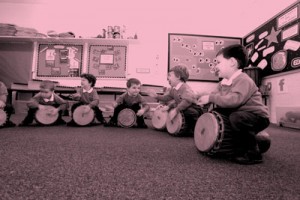SING! How Music Impacts our Children's Development
[caption id="attachment_2036" align="alignright" width="300"] Learning songs creates an understanding of the world around us and helps children to learn empathy and other life skills[/caption] By Miss Jo Stone, Head of School Music, Quinton House School The impact of the early years (birth to age five) on a child’s outcomes later in life is well documented. Early Years education is crucial in developing a range of skills including problem-solving abilities, creativity and physical skills as well as fostering a sense of well-being and discovery. Accepted theory is that taking music lessons as a child enhances brain function and structure. Children with musical training do better in language, reading, and maths and have better fine motor skills than their non-musical classmates. When exposure to music training begins before age seven, the brain enhancement that takes place can last a lifetime. Learning songs creates an understanding of the world around us and helps children to learn empathy and other life skills such as cooperation, patience, perseverance and respect. So what can parents do to help develop these valuable skills?
Learning songs creates an understanding of the world around us and helps children to learn empathy and other life skills[/caption] By Miss Jo Stone, Head of School Music, Quinton House School The impact of the early years (birth to age five) on a child’s outcomes later in life is well documented. Early Years education is crucial in developing a range of skills including problem-solving abilities, creativity and physical skills as well as fostering a sense of well-being and discovery. Accepted theory is that taking music lessons as a child enhances brain function and structure. Children with musical training do better in language, reading, and maths and have better fine motor skills than their non-musical classmates. When exposure to music training begins before age seven, the brain enhancement that takes place can last a lifetime. Learning songs creates an understanding of the world around us and helps children to learn empathy and other life skills such as cooperation, patience, perseverance and respect. So what can parents do to help develop these valuable skills?
-
Enjoy making noise!
Use pots and pans, lids and boxes to tap and hit along to rhymes, songs or even the radio. At Quinton House we enjoy following our heartbeat and listening to the sounds of the school. The reception class love to repeat rhythms and pulses using lots of tuned and untuned percussion, building the idea that we can look for patterns in our Literacy or Maths.
-
Sing every day
Singing helps children to develop a musical ear and recognise high and low sounds. At Quinton House pupils from year 1 - 4 learn to play instruments too which helps with cognitive and spacial awareness outside the music classroom.
-
Clap along to songs and rhythms
Clapping along to theme tunes on TV and other songs is a great way of engaging your child with music. Try playing a game where you clap a song or rhythm and they copy. Alternatively stamp your feet or even dance!
-
Play a broad range of music to your child
By playing different types of music to your child they will start to realise that not all music sounds the same and can eventually start to select music to listen to depending on their mood.
-
Imitate animals!
It’s always fun to try to sing and move like different animals – high, low, fast and slow. This will eventually lead to your child sharing their own ideas with you and a growing independence. Most of all, always have fun with music – it’s contagious! If you look like you're having fun so will they. We believe that a solid grounding in music will benefit the whole child, increase confidence and feed the heart and soul.
About the author Miss Jo Stone is the Head of Music at Quinton House School in Upton, Northampton. Quinton House is an independent, non-selective school for girls and boys aged 2 to 18, where specialist music teaching starts as early as Reception and pupils have the opportunity to participate in a number of musical activities. Established in 1946, the school is set in 31 acres of picturesque grounds. The continued success of pupils is a result of high aspirations, hard work, traditional values and a tailored programme of individualised learning.